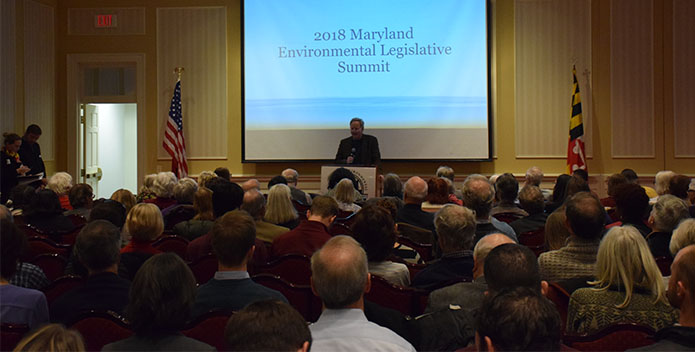In our current polarized and fractured political sphere, it is extremely rare for a clear majority to agree on anything. But across the Chesapeake Bay watershed, a diverse coalition is finding common ground on one topic—clean water.
In Virginia, a poll by the Wason Center for Public Policy and the Virginia Environmental Endowment found that 98 percent of Virginia voters agree that pollution in local rivers, streams, and lakes is an important issue. Yesterday, business leaders, elected representatives, and citizens gathered for the Maryland Environmental Summit. Addressing the standing-room only crowd, CBF President Will Baker acknowledged the remarkable unity among the group while saying, "In our lifetimes, yes we will say: the Bay has been saved!" And in the Keystone State, Pennsylvanians are united to restore the nearly 19,000 miles of the state's impaired rivers and streams.
The unity on clean water sets the perfect foundation as the legislative sessions in Virginia and Maryland gain steam and Pennsylvania enters the second year of its two-year session Monday. Stay tuned on how you can join us and millions of others in the fight for clean water!
This Week in the Watershed: Salty Roads, Collaborating States, and Brain Damage
- The Virginia General Assembly needs to invest in the Stormwater Local Assistance Fund, a successful grant program that helps communities reduce pollution and restore local waterways, argues CBF Virginia Executive Director Rebecca LePrell Tomazin. (Richmond Times Dispatch—VA)
- CBF President Will Baker writes on the harmful use of chlorpyrifos, a chemical pesticide known to cause brain damage in children. (Bay Journal)
- Salting roads excessively can have negative repercussions on local rivers and streams and the critters that call them home, writes CBF Pennsylvania Executive Director Harry Campbell. (York Dispatch—PA)
- Government, business, and environmental leaders came together in Annapolis to express their strong disagreement with the Trump administration's new offshore drilling policy. (Baltimore Sun—MD)
- Conflicting reports on the size of dead zones in the Bay often boil down to one variable—timing. (Bay Journal)
- A coalition of northeast states, including Pennsylvania, Maryland, and Delaware, are suing the EPA for failing to expand an air pollution control measure on western states. (Allentown Morning Call—PA)
- Developers at Fones Cliffs were issued a stop work order after illegally clearing acres of pristine forest without proper permits and environmental controls. (Free Lance-Star—VA)
What's Happening Around the Watershed?
January 21
- Easton, MD: Join us for a delightful afternoon enjoying oysters and wine. Hear from wine connoisseurs and representatives from three Eastern Shore aquaculture farms: Orchard Point Oysters, Madhouse Oysters, and Hoopers Island Oyster Company. There will also be oyster policy experts and scientists on hand to provide information and answer questions. Click here to register!
January 23
- Baltimore, MD: Join us for a screening of "An Inconvenient Sequel: Truth to Power," featuring former Vice President Al Gore as he travels the world uncovering issues related to climate change and human interaction with the natural environment. Following the film, attend a panel discussion, featuring professionals that focus their work on climate resiliency, air quality, and public awareness in Baltimore City. Click here to register!
- Baltimore, MD: Join us at a public hearing on Baltimore's aging sewer system. Baltimore City faces many water quality challenges from sanitary sewer overflows as a result of failing infrastructure. Learn more about this issue from experts at Baltimore City's Department of Public Works. For more information, contact Carmera Thomas at carmerathomas@cbf.org or 443-482-2011.
January 25-February 3
- Throughout Virginia: Help restore the health of the Chesapeake Bay and Virginia's rivers by participating in CBF's Grasses for the Masses program. Participants grow wild celery, a type of underwater grass, in their homes for 10-12 weeks. After 10-12 weeks of grow-out, participants will gather to plant their grasses in select local rivers to bolster grass populations and help restore the Bay. With workshops held throughout Virginia, there's plenty of opportunity to get involved. Click here to find one near you!




